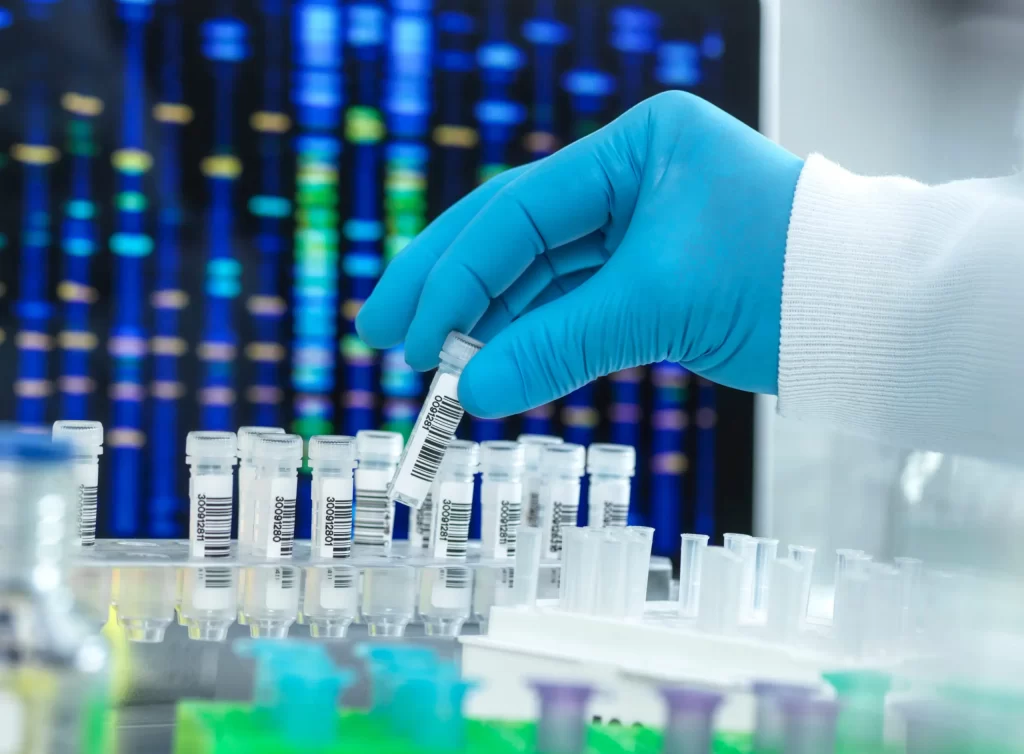Advantages and challenges of biomarker testing in healthcare

Biomarker testing plays a big role in healthcare, aiding in early disease detection and diagnosis, disease progression monitoring, and personalised treatment selection. Conducted and interpreted effectively, biomarker tests can lead to improved patient outcomes and greater efficiency in the healthcare system, through more effective, personalised treatment journeys.
In this article, we discuss what biomarker testing is, and the benefits they can bring to healthcare providers in the process of disease monitoring and treatment. We also discuss some challenges for researchers and medical professionals, and the industry’s response to overcoming such challenges.
What is biomarker testing?
Biomarker testing is the process of analysing specific biomarkers in biological samples. In healthcare, it is widely done by medical professionals and researchers to gain insights into biological processes and pathological conditions – whether it is to detect these conditions or monitor them.
As biomarkers can be molecules like protein, nucleic acids, or metabolites, as well as cellular structures, imaging features, or physiological parameters, there are many ways to obtain them. Some common ways are through collecting blood, urine, or tissue samples, or bodily fluids. Once samples are collected, they undergo laboratory analysis, in which biomarker levels can be quantified and interpreted in the context of a specific disease or condition.
Advantages of biomarker testing
Biomarker tests are often utilised in healthcare because they are accessible and provide relatively accurate insights into specific conditions and diseases. They also have the potential to be more affordable than other detection methods, such as the use of screening techniques or the performance of tissue biopsies.
Let’s take a closer look at some of the advantages of biomarker testing.
Affordability
One of the major advantages of biomarker testing in healthcare – more specifically in the detection of diseases – is its potential for affordability. Compared to other detection methods, like cancer screening, biomarker testing can be done swiftly, and biomarker tests can provide valuable information on the presence of a disease as well as its progression and development. With advances in technology and production, biomarker test kits can also be produced with lower costs.
Minimally invasive
Biomarker tests tend to be accessible and the testing process tends to be non-invasive or minimally invasive. For example, blood-based biomarker tests can be performed through a simple blood draw, which is usually part of a routine check-up performed in various healthcare settings. Depending on the testing objective, there may not be a need to perform more invasive procedures like tissue biopsies or surgeries to obtain testing samples.
The minimally invasive nature of biomarker testing not only contributes to lowered costs. It can also result in increased patient comfort and convenience, as invasive procedures carry the risk of complications, infection, or prolonged recovery time.
Personalised treatment planning
As biomarkers are specific, they can help guide personalised treatment decisions. When certain biomarker activity is measured and analysed, healthcare professionals gain valuable insights into an individual’s unique biological characteristics and their responses to treatment. These insights offer further personalisation of therapies in strength, frequency, and type.
Challenges in biomarker testing
While biomarker testing has been on the rise and are becoming increasingly accessible, their development is not without challenges.
Biomarker variability and reliability
Biomarker variability refers to the consistency or variation in biomarker measurement or observation. In the human body, there are natural variations that occur over time due to factors such as circadian rhythms, hormonal changes, or disease progression. This can lead to the fluctuation of biomarker activity and levels, which affects the reliability of testing.
Limited biomarker discovery
Identifying biomarkers to measure and interpreting their activity is a complex task. There are many potential biomarkers that fail to translate from research facilities to clinical practice. This could be due to a lack of reproducibility or limited specificity.
Limited biomarker functionality
A third challenge that comes with biomarker testing is the limited function and sensitivity of certain biomarkers that affect their applicability. Individuals have different biological characteristics, which can lead to false-negative or false-positive results.
For example, biomarkers like CA 15-3, which is used for monitoring breast cancer, may not be expressed in all patients. There may also be instances of patients with tumours that do not produce or release certain biomarkers used for monitoring, or biomarkers that can be elevated in conditions other than the targeted disease.
Overcoming biomarker testing challenges
However, as these challenges arise, researchers and healthcare providers have responded adequately to ensure accurate and reliable disease monitoring and treatment.
To minimise variability, there are protocols and quality control measures that can be implemented, and to increase the overall biomarker reliability, specific tests can also be used alongside other screening and tracking techniques to provide a more comprehensive analysis of disease progression.
Additionally, technology advancements in biomarker testing and imaging techniques are continually made. This can provide more insight into disease understanding, to allow for a more accurate assessment of prognosis or treatment response.
Finally, with the integration of omics data, more and more approaches have been created in the identification of new and meaningful biomarkers. Omics technologies include genomics, transcriptomics, proteomics, and metabolomics, which help researchers identify molecular markers. They also provide valuable information on disease mechanisms, heterogeneity, and treatment responses, allowing healthcare professionals to assess diseases more accurately.
Biomarker testing with your healthcare provider
The availability of biomarker testing can vary depending on several factors – your location, the specific biomarker, the disease you would like to assess, and your healthcare setting. While efforts are being made to improve the availability and accessibility of testing, you should reach out to your healthcare provider to see if it is available.







